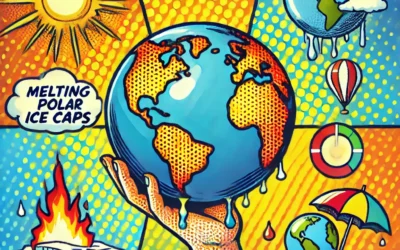What is the IPCC?
The Intergovernmental Panel on Climate Change (IPCC) was established in 1988 by the United Nations Environment Programme (UNEP) and the World Meteorological Organization (WMO) to provide governments with scientific information they can use to develop climate policies. The report is the primary output of this organization, synthesizing research from thousands of scientists worldwide to present an up-to-date understanding of climate change.
The Structure of the IPCC Report
The IPCC report is divided into several components, each focusing on different aspects of climate change. These include:
1. Working Group I: The Physical Science Basis
This section of the IPCC report focuses on the physical science of climate change. It examines the evidence for global warming, including temperature records, ice core data, and satellite measurements. The report also explores the role of greenhouse gases, the impact of human activities, and projections for future climate change.
2. Working Group II: Impacts, Adaptation, and Vulnerability
Working Group II assesses the impacts of climate change on ecosystems, human health, and economies. This part of the report also examines the potential for adaptation, including strategies to mitigate the effects of climate change and the vulnerability of different regions and communities to climate-related risks.
3. Working Group III: Mitigation of Climate Change
This section of the report focuses on strategies to reduce greenhouse gas emissions and slow the progression of climate change. It includes an analysis of renewable energy technologies, carbon capture and storage, and policy measures that can be implemented to limit global warming to safe levels.
4. Synthesis Report
The Synthesis Report integrates the findings from the three working groups into a comprehensive overview of the state of the climate. This part of the report is particularly valuable for policymakers, as it provides a concise summary of the scientific consensus on climate change and recommendations for action.
Key Findings of the IPCC Report
The IPCC report consistently highlights several key findings that underscore the urgency of addressing climate change:
1. Human Influence is Clear
One of the most critical findings of the IPCC report is the clear evidence that human activities, particularly the burning of fossil fuels, are the primary drivers of global warming. The report indicates that human influence has warmed the atmosphere, ocean, and land, leading to widespread and rapid changes in the Earth’s climate.
2. Impacts are Widespread and Intensifying
The report warns that the impacts of climate change are already being felt worldwide, with more frequent and severe weather events, rising sea levels, and disruptions to ecosystems and food security. These impacts are expected to intensify as global temperatures continue to rise.
3. Urgent Action is Needed
The report emphasizes the need for immediate and sustained action to reduce greenhouse gas emissions and limit global warming. The report outlines various pathways to achieve this, including transitioning to renewable energy, enhancing energy efficiency, and protecting and restoring natural ecosystems.
The Role of the IPCC Report in Global Climate Policy
The report plays a crucial role in informing global climate policy. It provides the scientific foundation for international climate agreements, such as the Paris Agreement, which aims to limit global warming to well below 2°C above pre-industrial levels. Policymakers rely on the findings of the IPCC to develop strategies for reducing emissions, adapting to climate impacts, and enhancing climate resilience.
Furthermore, the report serves as a critical tool for raising public awareness about climate change. By communicating the risks and potential solutions, the report helps to mobilize action at all levels of society, from individuals to governments and businesses.
Conclusion
The IPCC report is an indispensable resource for understanding the science of climate change and guiding global efforts to address this pressing issue. By synthesizing the latest research and providing clear recommendations, the IPCC report empowers policymakers, scientists, and the public to take informed action to protect our planet and future generations. The ongoing work of the IPCC remains vital as the world faces the escalating challenges of a changing climate.







